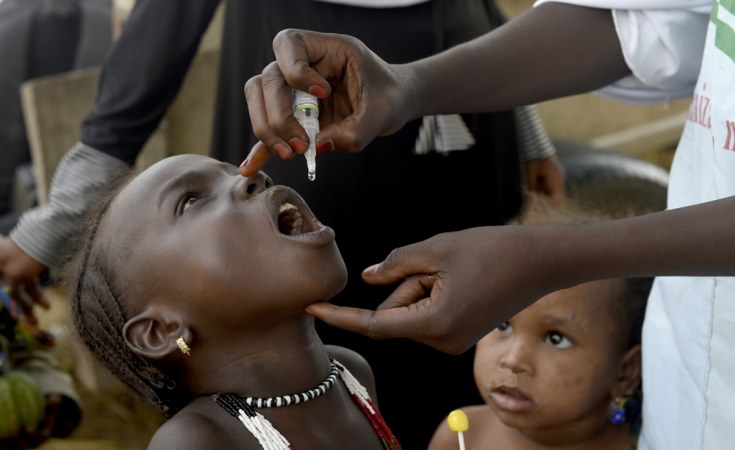"Could you patent the sun?" That was the acclaimed reply from Dr. Jonas Salk when asked whether he'd be patenting his breakthrough polio vaccine.
The poliovirus, which once killed or maimed hundreds of thousands of children every year and led to summertime lockdowns for children, is a step closer to being consigned to the history books.
With no recorded cases since 2016, the World Health Organization (WHO) African region's certification as wild poliovirus-free is one of the greatest achievements in public health history.
Delivering polio vaccines to every child in the African region and wiping out the wild virus is no small feat. The human resources, skills and experience gained in the process leave behind a legacy in how to tackle diseases and reach the poorest and most marginalized communities with lifesaving services.
Coordinated leadership across multiple sectors is required to eliminate polio - and other viruses.
Leadership from all levels of government across party lines, a historic public-private partnership that raised billions, millions of health workers reaching children across the region – from conflict zones to remote areas only accessible by motorbike or helicopter – and a culture of continual improvement were all critical to overcoming challenges and bottlenecks.
As countries work to suppress Covid-19, many of the same basic traditional public health methods used in polio eradication, including contact tracing and surveillance, are key to breaking the chains of transmission and saving lives and livelihoods from the first coronavirus pandemic in human history.
As recently as 2012 half of all globally recorded cases of wild poliovirus were in Nigeria – the final country in the region to rid the virus from its borders. However, as with the Covid-19 pandemic, the lesson is that it's never too late to turn a disease outbreak around. Through hard work, new innovations and ensuring that no child was missed, Nigeria and the entire African region have now defeated polio.
Across the region, health workers go village-to-village and door-to-door vaccinating children multiple times and offering health advice and support to the community. It's a remarkable effort started by Rotary International, which made a global call for eradication in the 1980s – when there were hundreds of thousands of cases every year.
The unique public-private partnership is spearheaded by governments across the world, which politically and financially back the effort, as well as a host of partners including Rotary, WHO, Unicef, the U.S. Centers for Disease Control and Prevention, the Bill & Melinda Gates Foundation, and Gavi, the global vaccine alliance.
Cooperation between cold-war adversaries was central to development of the polio vaccine.
There's a very good reason why the world's best scientists are racing to find a vaccine for Covid-19. Bringing polio to the brink of eradication was only possible because of safe and effective vaccines that were developed jointly by the United States and the USSR at the height of the cold war.

Putting common humanity before that of the nationalistic endeavour is a worthy act. It paid off for not only the United States and Russia but for the whole world.
Using the ACT-Accelerator, which aims to fast-track diagnostics, therapeutics and vaccines, WHO is currently working with the public and private sectors to accelerate the science and ensure that when new tools are available, they reach those who need them.
Learning from past cooperation and sharing finite supplies strategically and globally is in each country's national interest.
Africa is now free of 'wild polio' after a massive, coordinated international effort - a lesson for overcoming Covid-19.
With the African region hitting the golden number of zero cases of wild polio, the world's attention will now shift to the remaining places where the virus hides. And the good news is that the two remaining countries that still register cases of wild polio, Pakistan and Afghanistan, have resumed polio vaccination after a brief suspension due to Covid-19.
A surge of resources and effort is needed to ensure that the world uses this critical window of opportunity to protect all children in Afghanistan and Pakistan in the upcoming low-season, during which there is a natural decline in cases of the poliovirus.
Now is the moment to work with all partners and put child vaccination first so that we can end polio and the global health community can go on to tackle other vaccine preventable childhood diseases like measles, pneumonia and rotavirus diarrhea.
While thanking and congratulating governments, health workers, civil society and all groups that have been part of this titanic struggle; it is important to use the momentum to invest further in health systems, as well as in the health workforce, to protect people from this pandemic and prepare them for future disease outbreaks.
Polio and Covid-19 both demonstrate that the best ways to break the chains of disease transmission are when we work together in solidarity – accelerating the science and continually working to solve problems on the ground and improve service delivery.
Salk's vision of a polio-free world is within our grasp. Let's grab it with both hands and use it as our inspiration for a safer, healthier world.
Dr. Tedros Adhanom Ghebreyesus is Director-General of the World Health Organization. Holger Knaack is President of Rotary International.
Editors' note. There is now no circulating polio - called 'wild polio' - in the world, except in conflict areas of Afghanistan and Pakistan. Final eradication of all polio cases - the misleadingly named 'vaccine-derived' polio - will require higher levels of vaccination. The polio vaccine does not cause polio, but in rare cases, when a child is vaccinated, some weak mutations of the virus can occur in the intestines and be excreted. A vaccinated child does not become ill. But it is possible - where there is poor hygiene, contaminated water and low levels of vaccination - for an unvaccinated child to become sick. That is why it is so important to maintain the push to vaccinate every child in vulnerable areas.


